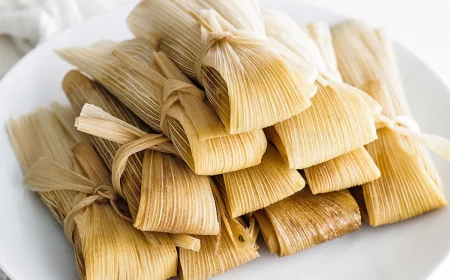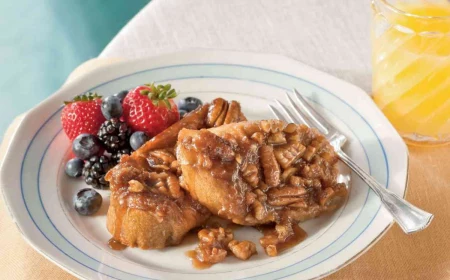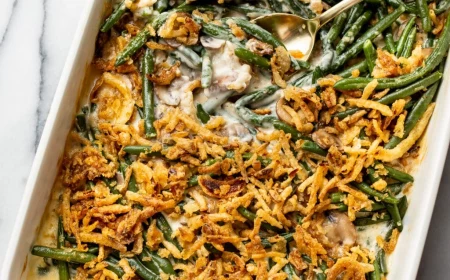Forget Recipes: This Is How You Actually Build an Amazing Taco
I’ve spent a lot of time in a lot of kitchens, from the high-energy city spots to the tiny, family-run places where the food just hits different. And after all that time, I can tell you one thing for sure: a truly great taco isn’t about following a recipe to the letter. It’s about balance. It’s a gut feeling for how textures, temperatures, and flavors should play together.
In this article
So many people get fixated on the filling, but honestly, that’s like talking about a painting’s subject while totally ignoring the canvas. The real art is in building the taco from the ground up. And that starts with the single most important part: the tortilla.
I still remember my first time trying to make tortillas from scratch. A total disaster. They were stiff, cracked, and tasted like dusty cardboard. My mentor, an older woman who had been pressing masa her whole life, just had a good laugh. She didn’t hand me a recipe card. Instead, she made me feel the dough and listen for the sizzle it makes on a hot comal. This guide is my attempt to pass along that kind of hands-on knowledge—the stuff you can’t get from a simple ingredient list.

The Heart of the Taco: Choosing Your Tortilla
You could have the most incredible filling in the world, but if you slap it on a cold, sad tortilla, you’ve got a bad taco. Period. A great tortilla is warm, pliable, and has a personality of its own. It’s there to complement the filling, not just be a delivery vehicle. You’ve basically got two roads to choose from: corn or flour. Neither is ‘better’—they’re just different tools for different jobs.
So, which one is right for you?
Think of it this way. Corn tortillas are the traditional, soulful choice. They’re made from nixtamalized corn (masa), which gives them a distinct, earthy, and slightly sweet corn flavor. Their texture is a bit more delicate, making them perfect for smaller street-style tacos where the filling is the star. Getting the hydration right is the key to success here. On the other hand, flour tortillas are the soft, sturdy workhorse, especially popular in northern Mexico. Made with wheat flour and fat (like lard or shortening), they are wonderfully soft, pliable, and a little bit chewy. They are fantastic for holding saucier fillings or for when you want a larger, more substantial taco. The secret to a good flour tortilla is using fat and letting the dough rest properly.

The Real Deal: Making Corn Tortillas
A true corn tortilla starts with masa harina, which is a special flour made from corn that’s been treated with lime. This isn’t the same as cornmeal, so don’t try to substitute it! You can find good-quality masa harina, like Maseca or Bob’s Red Mill, in most grocery stores for about $4-$6 a bag.
Quick Look:
• Time Commitment: About 45 minutes (10 mins mixing, 20 mins resting, 15 mins cooking).
• Yield: This makes about 16-20 small, street-taco-sized tortillas.
Let’s forget exact measurements and focus on the feel. Start with 2 cups of masa harina and slowly mix in about 1.5 cups of warm water with your hands. You’re aiming for the texture of soft Play-Doh—moist but not sticky. If it cracks when you squeeze it, add a tablespoon more water. If it’s a sticky mess, add a tablespoon more masa harina. Cover the dough with a damp towel and let it rest for at least 20 minutes. This is non-negotiable; it lets the flour fully hydrate.

Once rested, roll the dough into golf-ball-sized spheres. If you have a tortilla press, use it between two pieces of a plastic freezer bag to prevent sticking. Press firmly to get a 5-6 inch circle.
Heads up! No press? No problem. Just place a dough ball between the plastic sheets on your counter and press down firmly and evenly with the bottom of a heavy glass baking dish. Works like a charm.
Cook on a hot, dry cast-iron skillet or comal over medium-high heat. The pan is ready when a drop of water sizzles away instantly. Cook for 30-45 seconds, flip, cook for another 60 seconds, and then give it one last flip for 15-20 seconds. If you nailed the hydration and heat, it will puff up like a little pillow! As they come off the heat, stack them in a clean kitchen towel to steam and stay soft.
Troubleshooting Tip: If your tortillas are cracking at the edges, the dough is too dry. If they don’t puff up, your pan probably isn’t hot enough. It takes a little practice, so don’t sweat it on the first try.

The Supple Strength of Flour Tortillas
These are a different beast entirely, relying on gluten and fat for their signature soft, slightly chewy texture.
Quick Look:
• Time Commitment: About 1 hour (15 mins prep, 30 mins resting, 15 mins cooking).
• Yield: About 12 medium (8-inch) tortillas.
Whisk together 3 cups of all-purpose flour, a teaspoon of salt, and 2 teaspoons of baking powder. Then, using your fingertips, cut in about 1/3 cup of cold lard or vegetable shortening until it looks like coarse crumbs. Pour in 1 cup of very hot (not boiling) water and mix into a shaggy dough. Knead on a floured surface for just a minute or two until smooth—don’t overdo it! Let it rest, covered, for 30 minutes to relax the gluten. Then, divide and roll into thin circles, using as little dusting flour as possible to avoid a chalky taste.
Cook on a dry, medium-hot skillet for about 30-45 seconds per side, until you see large bubbles and lovely golden-brown spots. Like the corn ones, stack them in a towel to keep them warm and soft.

The Main Event: Fillings That Steal the Show
A great filling needs to have some backbone. It should be savory, well-seasoned, and maybe a little spicy to stand up to the tortilla and toppings.
Carne Asada (Grilled Beef)
This is all about the marinade and the char. Skirt steak is the classic choice for its beefy flavor, but it can be pricey, often running $15-$25 per pound. For a more budget-friendly option that’s just as tasty, look for flank steak or flap meat, which might be closer to $12-$18 per pound.
Quick Look:
• Time Commitment: 4 to 8 hours (mostly hands-off marinating), 20 minutes active cook time.
• Yield: 1.5 lbs of steak makes about 10-12 tacos.
For the marinade, think balance. I like a mix of orange and lime juice, a splash of soy sauce (or Maggi Jugo, which you can find in the international aisle), chopped cilantro, minced garlic, and sliced onion. Marinate the steak for at least 4 hours but no more than 8, or the citrus will make the meat mushy. When you’re ready to cook, get a grill or a cast-iron pan screaming hot. Pat the steak dry for a perfect sear, and cook for 3-5 minutes per side for medium-rare. The most important step? Let it rest for 10 minutes before slicing thinly against the grain.

Carnitas (Slow-Cooked Pork)
This is my weekend project. It’s a lesson in patience that rewards you with incredibly tender, juicy pork with irresistible crispy edges. You need pork shoulder (also called pork butt), which has the perfect amount of fat.
Quick Look:
• Time Commitment: 3-4 hours (mostly simmering), 30 minutes active time.
• Yield: A 4 lb shoulder makes a ton—enough for 25-30 tacos. Great for a party!
Cut a 4-pound pork shoulder into big chunks and put them in a heavy pot with some lard or oil, a halved orange (squeeze the juice in first), a quartered onion, and some garlic. Here’s a little trick: add a splash of Mexican Coca-Cola or a half-cup of milk. The sugars help the pork get beautifully browned and caramelized at the end. Add enough water to just cover the pork and let it simmer on low for 2-3 hours. The water will evaporate, and the pork will start frying in its own rendered fat. When it’s fork-tender, pull it apart and, if you want extra crispy bits (and you do), spread it on a baking sheet and pop it under the broiler for a minute or two.

A Modern Shortcut: Don’t have all afternoon? You can absolutely use a machine to do the heavy lifting.
• Slow Cooker: Throw everything in and cook on low for 8 hours or high for 4. Then shred and broil to get it crispy.
• Instant Pot: Use the sauté function to brown the pork chunks, then add the rest of the ingredients. Cook on high pressure for 45 minutes, let the pressure release naturally for 15 minutes, then shred and broil.
Pescado (Baja-Style Fried Fish)
This is your weeknight taco hero—light, crispy, and fresh. Use a firm white fish like cod, halibut, or mahi-mahi. The secret is an airy, carbonated batter.
Quick Look:
• Time Commitment: About 30 minutes, start to finish.
• Yield: 1.5 lbs of fish makes about 12-15 tacos.
The batter is simple: all-purpose flour, a pinch of salt, a little baking powder, and a light Mexican beer until it’s the consistency of thin pancake batter. By the way, if you want to skip the alcohol, ice-cold club soda or sparkling water works perfectly to get that same bubbly, light crust. Heat a neutral oil to about 375°F—a thermometer is your best friend here. Too cool and the fish gets greasy; too hot and the batter burns. Dredge fish strips in a little flour, dip in the batter, and fry for 2-3 minutes until golden brown. Drain them on a wire rack, not paper towels, to keep them crispy all around.

The Supporting Cast: Toppings & Salsas
Toppings aren’t just a garnish; they’re essential for balance. You need something acidic, something creamy, and something fresh.
- Salsa: A fresh pico de gallo is perfect for fish, while a tangy salsa verde cuts through the richness of carnitas.
- Creaminess: A drizzle of Mexican crema or sour cream thinned with a little lime juice cools things down.
- The Finishers: For me, finely diced white onion, chopped cilantro, and a fresh lime wedge squeezed over the top right before eating are non-negotiable. It wakes everything up.
Oh, and about cheese? In most of Mexico, shredded yellow cheddar isn’t a thing on traditional tacos. If cheese is used, it’s usually a salty, crumbly cotija (look for it in Latin markets or specialty cheese aisles) as a finisher.
Your Taco Night Game Plan
Making everything at once can feel chaotic. Here’s how to plan it out so you can actually enjoy yourself.

Day Before: Go ahead and make your salsa (the flavors will get even better overnight) and marinate your steak if you’re making carne asada.
Morning Of: If you’re making carnitas, get that simmering on the stove. This is also a great time to chop all your toppings—onions, cilantro, radishes—and store them in the fridge.
Right Before Serving: This is go-time. Cook your fish or steak. Make your tortillas or warm up the store-bought ones. Set everything out and let people build their own.
Always, always use two small corn tortillas per taco for strength. Put the hot filling in, then salsa, then the onion and cilantro. Let everyone add their own crema and lime juice at the table. That way, nothing gets soggy. Remember, a taco waits for no one!
Inspiration Gallery




The origin of the taco is a bit of a mystery, but one theory links it to 18th-century Mexican silver miners. The word ‘taco’ referred to the little paper charges they would use to blast ore from the rock face. The first ‘taco’ might have been a convenient, edible tool for hungry workers.



The Acid Test: A taco without a splash of acidity is a missed opportunity. It’s the element that cuts through the richness of the meat and fat, cleansing the palate and making you want another bite. A simple squeeze of fresh lime is classic, but don’t stop there.
- Quick-pickled red onions (just slice thin and soak in lime juice with a pinch of salt and sugar)
- A sharp, tangy tomatillo salsa verde
- Crumbled, salty Cotija cheese




How do I get that perfect char on my vegetables without turning them to mush?
High, direct heat is your friend. Use a cast-iron skillet or a very hot grill. Toss your sliced peppers and onions in a minimal amount of high-smoke-point oil (like grapeseed or avocado oil) and lay them in a single layer. Don’t crowd the pan! Let them sit, untouched, for 2-3 minutes until you get a deep char on one side, then give them a quick toss and serve immediately. You’re looking for color and crunch, not a long, slow sauté.



Don’t neglect your final garnish: It’s the last thing you taste and the first thing you see. A sprinkle of toasted pepitas (pumpkin seeds) adds a nutty crunch. Finely chopped chives can offer a milder onion note than raw white onion. A few microgreens can add a touch of elegance and peppery flavor. Think of it as the period at the end of a perfect sentence.




Cotija Cheese: Salty, dry, and crumbly. Think of it as the Mexican Parmesan. It doesn’t melt but adds a powerful savory punch and a slightly funky finish. Ideal for sprinkling over the top just before serving.
Queso Fresco: Soft, moist, and mildly tangy. It crumbles but can also be sliced. It provides a creamy, cooling contrast to spicy elements without overwhelming the other flavors.
The choice depends on whether you want a bold flavor accent (Cotija) or a soft, fresh counterpoint (Queso Fresco).



- A deep, smoky flavor profile.
- A tender, pull-apart texture.
- A rich, brick-red color in your stew.
The secret? Using dried chiles. Instead of just chili powder, try rehydrating whole dried Ancho and Guajillo chiles. Toast them briefly in a dry pan, soak them in hot water until soft, then blend them into a smooth paste to form the base of your marinade or braising liquid. This is a game-changer for beef barbacoa or pork adobo.



The fatal flaw of many tacos: temperature imbalance. Putting ice-cold pico de gallo or refrigerated sour cream directly onto piping hot meat creates a jarring experience and cools everything down too quickly. Try letting your cold toppings sit at room temperature for 15 minutes before serving. This small step makes a huge difference in the overall harmony of the taco.




Mexico is home to over 150 varieties of chiles, each with a unique profile of heat, sweetness, and smokiness.
This incredible diversity is the heart of regional Mexican cuisine. For a home cook, mastering just two or three is transformative. The smoky, mild Ancho (a dried poblano) provides a raisin-like sweetness, while the spicier, tangy Chile de Árbol brings pure, clean heat. Exploring these is like unlocking a whole new flavor vocabulary for your salsas and marinades.



The soundscape of a great taqueria is part of the magic. It’s the sharp, rhythmic chop of cilantro and onions on a wooden board, the sizzle of meat hitting a hot plancha, and the soft pat-pat-pat of masa being pressed into tortillas. Recreating even a part of that at home—turning up the heat to get a good sear, hearing that sizzle—connects you to the process and builds anticipation for the first bite.




Can I use my leftover roast chicken or pork?
Absolutely. This is the soul of true home cooking. Shred the leftover meat and reheat it gently in a skillet. To bring it back to life, add a splash of chicken broth or even orange juice, along with a pinch of cumin and Mexican oregano. Let it simmer until the liquid is absorbed. You get incredible flavor with minimal effort, and nothing goes to waste.



- Salsa Verde Cruda: For a blast of raw, electric flavor, simply blend tomatillos, a serrano chile, cilantro, a chunk of white onion, and salt. It’s uncooked, vibrant, and perfect for rich carnitas.
- Salsa Roja Asada: For a deep, smoky salsa, roast plum tomatoes, garlic, and jalapeños on a pan until charred and soft. Blend with a pinch of salt. This complements grilled steak (carne asada) beautifully.



A note on fat: Don’t fear it. Fat equals flavor and moisture. When making carnitas, the traditional method involves slowly cooking pork in its own rendered fat (lard), a process called confit. For ground beef, using an 80/20 blend provides enough fat to keep the meat juicy and create a flavorful base. Draining off *all* the fat after browning is a common mistake that leads to dry, crumbly taco meat.




Think beyond ground beef. Some of the most memorable tacos are built on texture.
- For Crunch: Crispy, beer-battered fish or fried shrimp.
- For Tenderness: Beef tongue (lengua) slow-braised until it’s fork-tender.
- For a Satisfying Chew: Grilled Portobello mushrooms or seared Halloumi-style cheese.



What exactly makes a ‘Taco al Pastor’?
It’s all about the ‘trompo’. Tacos al Pastor feature pork marinated in a blend of dried chiles, spices, and pineapple. The meat is then layered onto a large vertical rotisserie, crowned with a whole onion and a pineapple. As it spins and cooks, the crispy outer layers are shaved off directly into a tortilla and often topped with a sliver of the roasted pineapple. It’s a direct descendant of the Lebanese shawarma spit, brought to Mexico by immigrants.




The secret to a non-soggy taco? Double up. Street vendors in Mexico often use two small corn tortillas for a single taco. This provides structural integrity against juicy fillings and saucy salsas. It’s a simple trick that ensures your taco makes it from the plate to your mouth in one piece.



- A cool, creamy counterpoint to spice.
- A touch of richness without being heavy.
- An extra layer of tangy flavor.
The method? A simple avocado-lime crema. In a blender, combine one avocado, the juice of a lime, a small handful of cilantro, a spoonful of sour cream or Greek yogurt, and a splash of water to thin. Blend until silky smooth. It’s a versatile sauce that elevates almost any taco.




The power of pickled carrots and jalapeños: That little side of tangy, spicy vegetables served at many taquerias isn’t just a garnish. It’s a palate cleanser. A bite of a pickled jalapeño between tacos resets your taste buds, cutting through richness and preparing you for the unique flavor profile of the next one. You can find jars of them, like those from La Costeña, in most international aisles.



Stop throwing away your cilantro stems! They are packed with even more flavor than the leaves. Finely chop the tender upper stems and mix them in with your pico de gallo or blend them into your salsas and marinades for a more potent, herbaceous kick. It reduces waste and improves your dish.



Lentil & Walnut Filling: A surprisingly ‘meaty’ vegetarian option. Sauté cooked brown lentils with finely chopped walnuts, onions, garlic, and a generous amount of chipotle powder and cumin.
Sweet Potato & Black Bean: A classic for a reason. Roast cubes of sweet potato until tender, then toss with black beans, corn, and a squeeze of lime juice.




Feeling adventurous? Try making Salsa Macha. Hailing from Veracruz, it’s an oil-based salsa, not a fresh one. It’s made by infusing oil with a crunchy mix of toasted dried chiles (like Ancho and Morita), peanuts or sesame seeds, and garlic. It has a nutty, smoky, moderately spicy flavor and an incredible texture. A spoonful on top of any taco adds a complex, crunchy finish that’s wildly addictive.



On average, Americans consumed over 4.5 billion tacos last year. The ‘Taco Tuesday’ phenomenon, popularized in the 1980s, has cemented the taco as a weekly staple in many households.
This massive popularity has fueled incredible innovation, from the rise of Korean-inspired kimchi tacos to the recent explosion of the consomé-dipped Birria taco trend on social media. The taco is constantly evolving.




The Comal: The traditional tool for heating tortillas is a comal—a smooth, flat griddle, often made of cast iron or earthenware. It provides even, dry heat that toasts the tortilla, making it pliable and fragrant. No comal? A dry, well-seasoned cast-iron skillet is the perfect substitute. Avoid the microwave, which steams tortillas and makes them rubbery.



Why do recipes for refried beans call for lard?
Tradition and flavor. Lard, or rendered pork fat, adds a subtle, savory richness and a silky smooth texture that you simply cannot replicate with oil or butter. It’s the ‘secret ingredient’ that gives authentic refried beans their characteristic depth and satisfying mouthfeel. Brands like Morrell or Armour sell quality lard, or you can render your own.


The final squeeze of lime is non-negotiable. It’s the final brushstroke. That sharp, citrusy zing brightens every other flavor in the taco, from the rich, savory meat to the spicy salsa and fresh cilantro. It’s the note that brings everything into focus. Always serve tacos with a bowl of fresh lime wedges on the side.










